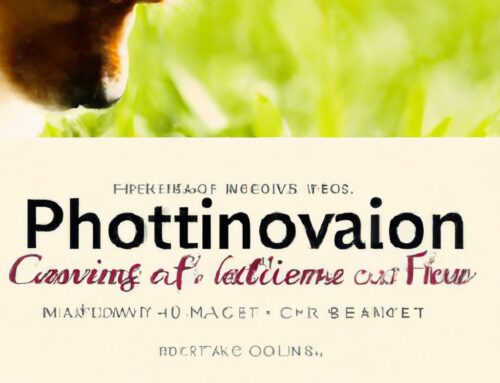As we welcome a new furry bundle of joy into our lives, it’s important to ensure that they receive the best nutrition possible to support their growth and development. Just like a blank canvas awaiting vibrant colors, a puppy’s diet sets the foundation for a healthy and happy life ahead. In this article, we will explore the essential nutrition advice for your growing puppy that will help them thrive and flourish into a strong and energetic adult dog. From choosing the right food to feeding schedules and portion sizes, let’s delve into the world of puppy nutrition together.
Table of Contents
- Healthy Diet for Developing Puppies
- Optimal Nutritional Balance for Growth
- Key Nutrients for Supporting Bone and Muscle Development
- Feeding Schedule and Portion Control for Puppies
- Q&A
- Future Outlook
Healthy Diet for Developing Puppies
Feeding your developing puppy a healthy diet is crucial for their growth and overall well-being. To ensure your furry friend gets all the nutrients they need, consider the following tips:
- Choose high-quality puppy food: Look for a balanced diet specifically formulated for puppies. Check the ingredients list and make sure that real meat is listed as the first ingredient.
- Feed frequent meals: Puppies have small stomachs and high energy levels, so they benefit from multiple small meals throughout the day. Aim for 3-4 meals spaced out evenly.
- Monitor weight: Keep an eye on your puppy’s weight to ensure they are growing at a healthy rate. Consult with your veterinarian if you have any concerns.
| Age | Recommended Daily Food |
| 2-4 months | 3-4 meals per day |
| 4-6 months | 2-3 meals per day |
It’s also important to provide your puppy with fresh water at all times. Avoid feeding them human food or table scraps, as these can be harmful to their digestive system. By following these nutrition tips, you can help your puppy grow into a healthy and happy adult dog.
Optimal Nutritional Balance for Growth
Ensuring that your puppy receives the proper nutrition is crucial for their growth and development. A well-balanced diet is essential in providing the necessary nutrients for your furry friend to thrive. This includes a combination of protein, carbohydrates, fats, vitamins, and minerals to support their overall health.
When it comes to feeding your growing puppy, quality matters. Choose a premium puppy food that is specifically formulated for their age and size. Look for brands that use high-quality ingredients and avoid fillers or artificial additives. Additionally, consider incorporating fresh fruits and vegetables into their diet for added vitamins and antioxidants. Consulting with a veterinarian can also help you create a personalized nutrition plan that meets your puppy’s individual needs.
Key Nutrients for Supporting Bone and Muscle Development
When it comes to ensuring optimal bone and muscle development in your growing puppy, it’s important to focus on providing key nutrients that support their growth and overall health. One of the essential nutrients for bone health is calcium. Calcium plays a vital role in bone formation and strength, making it crucial for your puppy’s skeletal development. Additionally, phosphorus works alongside calcium to support bone mineralization, helping to ensure that your puppy’s bones grow strong and healthy.
Another important nutrient for supporting muscle development in your growing puppy is protein. Protein is essential for building and repairing muscle tissue, making it crucial for your puppy’s overall muscle growth and strength. Additionally, including sources of omega-3 fatty acids in your puppy’s diet can help support muscle function and mobility, promoting overall health and well-being. By incorporating these key nutrients into your puppy’s diet, you can help ensure that they have the proper support for optimal bone and muscle development during this critical growth stage.
Feeding Schedule and Portion Control for Puppies
When it comes to ensuring your furry friend grows up healthy and strong, having a proper feeding schedule and portion control is key. Puppies have specific nutritional needs that differ from adult dogs, so it’s important to provide them with the right balance of nutrients for their growing bodies.
**Here are some tips to help you establish a feeding schedule and portion control for your new puppy:**
- Feed your puppy 3-4 times a day to support their fast metabolism and growth.
- Monitor your puppy’s weight and adjust portion sizes accordingly to prevent overfeeding.
- Choose a high-quality puppy food that is appropriate for your puppy’s breed and size.
- Consult with your veterinarian to determine the best feeding schedule and portion sizes for your specific puppy.
| Age | Number of Meals per Day |
|---|---|
| 8-12 weeks | 4 meals |
| 12-16 weeks | 3 meals |
| 4-6 months | 2 meals |
Q&A
Q: Why is proper nutrition important for growing puppies?
A: Proper nutrition is vital for growing puppies as it supports their overall health, development, and energy levels.
Q: What are some key nutrients that puppies need in their diet?
A: Puppies require a balanced diet rich in protein, fats, carbohydrates, vitamins, and minerals to support their growth and development.
Q: How often should I feed my puppy?
A: Puppies typically require 3-4 small meals per day, spaced evenly throughout the day to maintain their energy levels and support their growth.
Q: Are there any specific foods I should avoid feeding my puppy?
A: It’s important to avoid feeding puppies foods that are toxic to dogs, such as chocolate, grapes, and onions. Additionally, puppies should not consume excessive amounts of table scraps or fatty foods.
Q: How can I ensure my puppy is getting the right nutrition?
A: Consult with your veterinarian to determine the best diet for your puppy’s specific needs. They can provide guidance on choosing a high-quality puppy food and recommend any necessary supplements.
Future Outlook
As you embark on the journey of raising a healthy and happy puppy, remember that nutrition plays a crucial role in their growth and development. By following the best advice for providing the right balance of nutrients, you can ensure that your furry friend thrives during their formative years. So, whether it’s choosing the right food, monitoring portion sizes, or seeking advice from a veterinarian, remember that a well-nourished puppy is a happy puppy. Here’s to many years of tail wags, playtime, and unconditional love with your growing companion!





